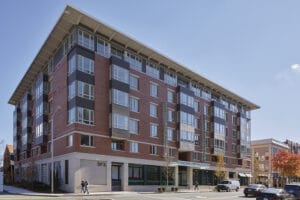
All but two units in the BRIX condo development were sold ahead of its ribbon-cutting in December. Developers Urban Spaces and Diamond/Sinacori partnered on the $35-million transit-oriented redevelopment of a former district courthouse. Photo courtesy of Urban Spaces
In the spring of 2015, the city of Salem sought to increase the vibrancy of its downtown by replacing the vacant Salem District Courthouse at 65 Washington St. with a new building that would serve as an anchor to further energize the downtown district.
The courthouse site effectively served as the entrance corridor to the historic downtown, which was placed on the National Register of Historic Places in 1983. Located just 100 yards from the MBTA commuter rail, which provides convenient access to Boston’s North Station in less than a half-hour, the site was a natural choice for Urban Spaces to construct a multifamily transit-oriented development.
The city issued a request for proposal and ultimately awarded the project to Diamond/Sinacori’s principal, Merrill Diamond, who is a frequent Urban Spaces joint venture partner. The mixed-use project consisting of 61 condominium units and 3,000 square feet of ground floor retail space was branded “BRIX” and became the latest of many projects that the team has developed that combines TOD with historic renovation and adaptive reuse.
Prior to BRIX, Diamond/Sincaori partnered with Urban Spaces to develop The Lancaster, a sustainable, transit-oriented 55-unit condominium complex in Brighton, which became Boston’s first multifamily home ownership project to achieve LEED Gold certification. The team also brought back The Lancaster’s architect, Tise Design Assoc. of Newton, and retained Groom Construction of Salem to build the project, which broke ground in late summer of 2019 after a lengthy approval process.
BRIX provided much-needed market-rate housing (along with six affordable units) to support the shops and restaurants in Salem’s downtown. The units were marketed primarily to empty-nesters and young professionals, two strong demographic groups for TOD projects. However, since there were few comparable condominium projects in Salem with which to determine market appeal, there was considerable risk involved for the development team.
Unpleasant Surprises Imperil Project
Despite acquiring the land from the Salem Redevelopment Authority at a relatively low market-value price, and securing $20 million in debt financing from Salem Five, margins became strained as construction costs from the original estimates in 2015 had increased considerably.
The viability of the project itself became endangered when the construction team found during the demolition process more site contamination than expected, and later it was discovered that several hundred feet of stormwater pipe was clogged with concrete. These two issues ultimately added over $2 million in remediation costs to the project, which were approaching $35 million. At the time of the proposal, condominium prices for the market were topping out at around $400 per sellable square foot, so the project was clearly in jeopardy.
Midway through pre-development, Greg Winter, the project manager, learned of the commonwealth’s Housing Development Incentive Program, also called HDIP. The program provides Gateway Cities such as Salem with a tool to grow and diversify their housing stock stock and support economic development by providing tax incentives for market-rate housing.
A Landmark Award
Up until that time, HDIP had been used exclusively for rental housing. However, the development team submitted an application and became the first home-ownership project in Massachusetts to utilize the program.
 The agreement allowed the project to raise nearly $2 million in tax credits (the maximum per project), which helped balance the financial viability of the project. HDIP stipulated that 80 percent of the residences had to be sold in order to receive the benefit, a milestone that BRIX achieved well before completion. All but two of the units were under agreement at the time of the ribbon-cutting in December.
The agreement allowed the project to raise nearly $2 million in tax credits (the maximum per project), which helped balance the financial viability of the project. HDIP stipulated that 80 percent of the residences had to be sold in order to receive the benefit, a milestone that BRIX achieved well before completion. All but two of the units were under agreement at the time of the ribbon-cutting in December.
The HDIP program is a prime example of how government and the private sector can work together to spur economic development. The HDIP made it possible for the Urban Spaces/Diamond Sinacori partnership to deliver the BRIX condominium development, providing a mix of one- two- and three-bedroom units to a demographic seeking an urban-suburban living experience in one of the commonwealth’s most beautiful and historic downtowns.
Paul Ognibene is founder and CEO of Cambridge-based Urban Spaces.





